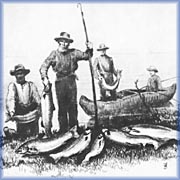|
By the mid-nineteenth century, the inland fishery
was not just a food source but a leisure pursuit for residents to
enjoy.
 he growth of New Brunswick's
population and industry by the 1840s resulted in a change of lifestyle
for some of its residents. To that point, a survivalist mentality had
prevailed and the province's natural resources were seen from a purely
utilitarian point of view and were considered an inexhaustible source
of sustenance. After 1840, continued immigration and development was
encouraged, but outside commentators now extolled the virtues of New
Brunswick's scenery as much as the value of its shipbuilding or lumber
industries. he growth of New Brunswick's
population and industry by the 1840s resulted in a change of lifestyle
for some of its residents. To that point, a survivalist mentality had
prevailed and the province's natural resources were seen from a purely
utilitarian point of view and were considered an inexhaustible source
of sustenance. After 1840, continued immigration and development was
encouraged, but outside commentators now extolled the virtues of New
Brunswick's scenery as much as the value of its shipbuilding or lumber
industries.
|

|

Maliseet Indian Wooden Hut Interior (detail),
reproduction of original watercolour by Robert Petley, about 1850
(New Brunswick Museum, Webster Collection, W5943)
|
|
The inland or non-tidal fishery was a good example of this change.
While many residents saw this resource primarily in terms of food,
some began to take to the rivers and lakes as a recreational pursuit.
Overfishing, especially with nets, continued and remained a problem
into the twentieth century but the use of the rod and reel marked a
shift in the way this resource was harvested. It suggested a world
with more leisure time and, perhaps, the beginnings of an
appreciation for fishing for its own sake.
|

|

One Day's Catch (detail),
reproduction of original acquatint by George S. Ferrier in Dean
Sage, The Ristigouche and Its Salmon Fishing, Edinburgh, 1888
(New Brunswick Museum)
|
|



